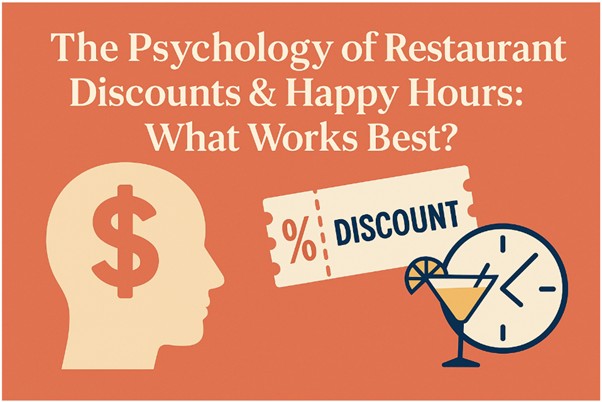
How to Use Data Analytics to Predict Customer Orders & Increase Profits
Offering discounts is one of the oldest strategies in the restaurant business—but not all discounts are created equal. From happy hours to combo offers, percentage cuts to buy-one-get-one deals, understanding the psychology behind promotions can help restaurateurs boost revenue without eroding brand value.
Chef Shajahan M Abdul, founder of Restro Consultants Pvt Ltd (RCPL), says, “The right discount at the right time isn’t a cost—it’s a catalyst. But too many restaurants give away margins without getting loyalty or long-term sales in return.”
So, what works in restaurant
discounting? How do you create happy hours and offers that excite customers and
protect your bottom line?
Let’s break it down.
Why Do Restaurant Discounts
Work?
At their core, discounts tap
into consumer psychology:
Chef Abdul adds, “People don’t
just love food—they love feeling smart about how they got it. The
emotion behind the offer matters as much as the offer itself.”
Types of Restaurant Discounts
That Work Best
Here’s how restaurant
consultants categorise and recommend discounts for different goals:
1. Time-Based Offers (Happy
Hours)
Best for: Increasing traffic
during slow hours (3–6 PM, post-lunch slump, early dinner)
Why it works: It creates urgency and routine. People plan around time-bound
deals.
Chef Shajahan M Abdul
recommends keeping happy hour menus limited but high in margin—like drinks,
finger food, or shareable platters.
Pro tip from RCPL: Use
happy hours to introduce high-margin or underperforming items in small portions
for discovery.
2. Percentage Discounts (e.g.,
20% off)
Best for: General promotion,
app launches, first-time orders
Why it works: It is Easy to understand, flexible, and widely appealing.
But beware: it can devalue your
brand if overused.
Chef Abdul says, “Too many
restaurants train customers to wait for offers. The discount should feel like a
reward, not an expectation.”
3. Combo Deals
Best for: Takeaway, delivery,
and increasing average ticket size
Why it works: Customers perceive more value when bundling multiple items at a
better price.
Restro Consultants Pvt Ltd
(RCPL) often helps brands design combos around popular or profitable items.
Pairing a bestseller with a lesser-known item boosts exposure and sales for
both.
4. BOGO (Buy One Get One Free)
Best for: Beverage sales,
dessert promos, or low-cost appetisers
Why it works: The word “free” has a massive psychological pull. It also
encourages group dining and sharing.
Chef Shajahan M Abdul
recommends using BOGO during launch phases or slower weekdays to build buzz.
5. Loyalty-Linked Discounts
Best for: Retention and repeat
visits
Why it works: It feels like a reward, not a promotion. Customers are more
likely to return for personalised deals.
Restaurant consultants at RCPL
build loyalty programs with automated milestone triggers: “Spend ₹2000,
get ₹200 off
next time,” or “Visit 3 times a month, get a free dessert.”
Chef Abdul explains,
“Loyalty-linked offers work because they’re earned, not expected.”
The Psychology Triggers That
Make Discounts Effective
1. Urgency
– “Today Only” or “Last 3 Days” forces quicker decision-making.
2. Scarcity
– “First 50 Customers” or “Only on Wednesdays” creates exclusivity.
3. Anchoring
– Showing original vs discounted price influences perceived value.
4. Social
Proof – “Our most popular combo” boosts trust and encourages conformity.
5. Personalization
– Offers based on past orders or special occasions feel more thoughtful.
Chef Shajahan M Abdul notes,
“The most powerful promotions don’t shout louder—they speak directly to the
customer’s mindset.”
Typical Discount Mistakes
Restaurants Make
❌ Relying too heavily on aggregator-led discounts
This eats into margins and
dilutes brand perception. Instead, push in-house offers via your
platforms—WhatsApp, email, or loyalty apps.
❌ Not tracking redemption rates or profitability
Numbers should back every
promotion. Restro Consultants Pvt Ltd (RCPL) provides promo performance
dashboards to measure impact.
❌ No clear call to action
“Get 10% off” is less potent
than “Dine in before 7 PM and save 10% on your total bill.”
How to Structure Offers Without
Losing Profits
Chef Abdul offers a simple
framework:
1. Choose
your goal: Is it footfall? New customers? Higher check size?
2. Pick
the format: Time-based? Combo? Percentage off?
3. Select
target items: Preferably high-margin or high-visibility dishes
4. Define
the channel: In-app? Social media? Email? Standee at entrance?
5. Track
results: Measure cost vs uplift in sales or traffic
RCPL ensures that each discount
aligns with the restaurant’s positioning. For example, a fine-dining outlet
offering 50% off on weekends might gain volume but lose brand equity.
Case Studies from RCPL
Final Thoughts from Chef
Shajahan M Abdul
Restaurant discounts are a
science rooted in emotion, timing, and value perception. They build buzz, drive
traffic, and increase profit when designed well. But when done without intent,
they become costly habits that customers exploit.
As Chef Shajahan M Abdul puts it:
“A discount should feel like a gift, not a gimmick. The smartest restaurants
offer less—but make it feel like more.”
With support from expert
restaurant consultants at Restro Consultants Pvt Ltd (RCPL), your business can
design discount strategies that are not only attractive but also strategically
profitable.
Chef Abdul © Copyright 2024. All rights reserved.